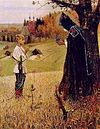

| Previous day | Next day |
| Old Style
September 25
|
Sunday |
New Style
October 8
|
| 18th Sunday after Pentecost. Tone 1. | No fast.
|
![]() St. Euphrosyne, nun, and her father St. Paphnutius, monk, of Alexandria (5th c.).
St. Euphrosyne, nun, and her father St. Paphnutius, monk, of Alexandria (5th c.). ![]() Repose of St. Sergius, abbot, of Radonezh (1392).
Repose of St. Sergius, abbot, of Radonezh (1392).
Monk-martyr Paphnutius and 546 companions, in Egypt (ca. 303). St. Euphrosyne, nun, of Suzdal (1250). Translation of the relics of St. Herman, archbishop of Kazan (1595). St. Dosithea the Recluse, of the Kiev Caves (1776).
Commemoration of the earthquake in Constantinople in 447. St. Cadoc, abbot, of Llancarfan (577). St. Finbarr (Barry), bishop of Cork (ca. 633). St. Ceolfrith (Geoffrey), abbot, of Wearmouth-Jarrow Monastery (716). St. Arsenius the Great, catholicos of Georgia (887). Martyrs Paul and Tatta and their children Sabinian, Maximus, Rufus, and Eugene, of Damascus.
Repose of philosopher Alexei Stepanovich Khomiakov (1860).
Thoughts for Each Day of the Year
According to the Daily Church Readings from the Word of God
By St. Theophan the Recluse

Eighteenth Sunday After Pentecost. [II Cor. 9:6-11; Luke 5:1-11]
The fishermen toiled for an entire night and took nothing; but when the Lord entered their ship, and, after preaching commanded them to cast their net, they took so many that they could not pull them out and the net broke. This is an image for all work without God’s help, and for work with God’s help. When one person works, wanting to achieve something through his strength alone—he is all thumbs. When the Lord draws near to him, then one good thing after another flows in from somewhere. In the spiritual-moral sense the impossibility of success without the Lord is tangibly visible: Without Me ye can do nothing, said the Lord. And this law acts in all things. Just as a branch not grown onto a tree not only does not bear fruit, but dries up and loses its life as well, neither can people bring forth fruits of truth valuable for eternal life if they are not in living communion with the Lord. Any good that they might have is only an appearance of good, but in essence it is faulty—like a forest apple that appears red but if you taste it, it is sour. It is also tangibly clear in an external, worldly sense: one struggles and struggles, and all in vain. When God’s blessing descends, all comes out well. Those who are attentive toward themselves and the paths of life know these truths through experience.
Articles
 Second Translation of the relics of St Herman the Archbishop of Kazan |

















